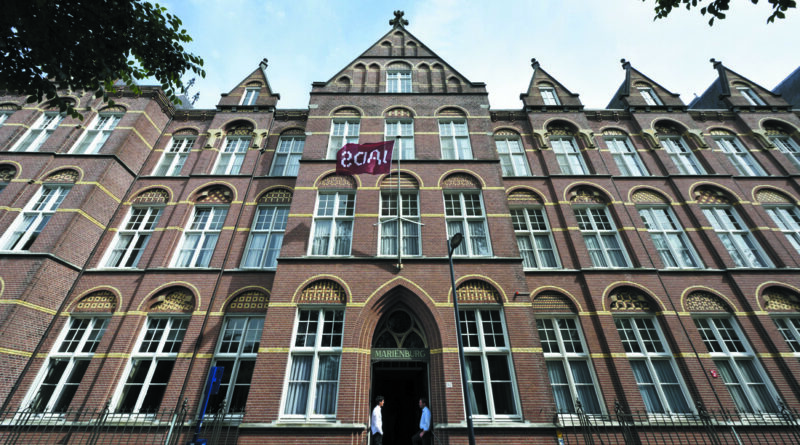Jheronimus Academy of Data Science, Nice to meet You
On a drowsy Thursday morning Max and I took the train to Den Bosch to pay a visit to the Mariënburg, the location of the Jheronimus Academy of Data Science (JADS). As probably not many of you know, this is the new location of the master’s program Data Science & Entrepreneurship: a master’s program that is directly accessible for any student with an Econometrics Bachelor degree. To find out what this Master entails, we spoke with the program director: professor Willem-Jan van den Heuvel.
Text by: Thomas van Manen
Professor Van den Heuvel is affiliated with TiSEM as he used to be the program director for the Master Information Management. He is specialized in distributed systems, and originally used to work with very large databases. He first heard of the initiative through the well-known professor Dick den Hertog, so you could say that he was involved since the birth of this new program.
To find the origins of the JADS we have to go back in time by a few years. It started with conversations between the former dean of Mathematics and Informatics in Eindhoven, our current rector Emile Aarts, the dean of TiSEM Lex Meijdam, and the former dean of TLS, Corien Prins, to start a new cooperation between Tilburg University and the TU Eindhoven regarding Data Science.
Contrary to what you may think, JADS is not solely located at the new campus in Den Bosch. JADS can be found at three campuses, the TU Eindhoven, Tilburg University, and Den Bosch. It consists of multiple master’s such as Data Science & Engineering in Eindhoven, Data Science & Governance in Tilburg, but also the econometrics Master Business Analytics & Operations Research. However, all these master’s programs focus solely on one discipline. The main difference between the new Master Data Science & Entrepreneurship and the previous mentioned master’s programs is that it is multidisciplinary.
Data Science & Entrepreneurship
Professor Van den Heuvel explains the philosophy behind the program as follows: Tilburg University focusses on understanding society and on contemplative studies. It looks at society, economic developments and data, and tries to increase the understanding and the knowledge about it. The TU Eindhoven on the other hand, focusses on creating and building solutions, and engineering. The idea of JADS and of the Master Data Science & Entrepreneurship is to combine these goals. This results in the following process: finding problems in society and issues companies run into, and then build solutions for these problems. After these solutions are built, they are validated and tested on new, similar problems.
The program is a two-year program, is a Beta studies, and focusses (as the name suggests) on Data Science and Entrepreneurship. The program consists of four pillars, where the main focus is on the first two mentioned hereafter. The first one is data engineering: what are data pools and data lakes and how do you connect to these with Hadoop or Spark. What is an Apache data stack, how do you program in Python. This pillar really focusses on bringing solutions into production. “Very important, if you want to bring anything to market as an entrepreneur”, states professor Van den Heuvel.
The second pillar is (data) analysis. How to increase your understanding of a problem by means of data? This could be by means of traditional statistical or mathematical methods, but also newer methods such as deep learning, machine learning and artificial intelligence are used.
The third one is entrepreneurship. It focusses on showing the new data driven business models. Many companies such as banks and insurance companies are very aware that the world is changing, and are trying their best to adapt to this. One of the means for this is data. An example Professor Van den Heuvel gives is Philips. Philips is way past the days of earning their money on light bulbs or LEDs. They need innovative ways to make use of the data these devices provide. For instance, determining the occupancy rate of an office by measuring the total time lights are on, and determining the cleaning frequency with this data. Or in health care, checking whether someone has been sitting still for too long, and sending out an alert when someone has not moved in a while.
The final pillar is ethics: what are the ethical implications of the use of data science? The goal of the program is not to deliver data engineers or data scientists, but to deliver data entrepreneurs. This means that you should also be aware of the possible implications of your enterprise on society, and whether this implication is desirable. For instance, you might be able to make a great data driven dating site, and try to incorporate things like LinkedIn and Facebook data to find someone’s perfect match, but whether this is desirable privacy-wise is debatable.
The program is quite intensive. All courses are taught by two different teachers, and all subjects should make use datasets. A semester consists of 5 courses with 3 hours of lectures and 3 hours of tutorials per course per week, so quite a lot more than the average Tilburg University master’s program. There is also extensive personal guidance by means of a skill journey. These skills are not the traditional writing or presenting skills, but skills like leadership, negotiating, persuading or creativity. There are trainers and individual assessments to develop your own skills. There are also mentors that work in the business sector already and people that can give you advise on finance or legal issues if you want to start your own enterprise.
Connection Econometrics
The program is directly accessible for anyone with a bachelor in econometrics. As a matter of fact, Professor Van den Heuvel states: “The program was designed with an econometrics background in mind”. However, currently in information sessions in Tilburg, a wide plethora of students is present, ranging from IBA, to Information Management to HBO students, but very few econometrics students, while from Tilburg only econometricians can access the program without following a pre-master. The program is also directly accessible for people that studies mathematics, informatics or the new Bachelor Data Science (that is also taught in Den Bosch).
Application in business
There is a lot of interest from various companies in JADS. There will be companies that have their offices on the new campus, such as various governmental organizations, and the innovation platform of the Dutch police. This makes it very easy to have (informal) contact with these companies, as they will work and have lunch in the same place as the students. Next year, the JADS association will start, enabling companies to provide students with master classes, executive teaching, hackathons, you name it. In exchange companies could provide data or work together for initiatives like joint ventures.
Therefore, the focus is mainly on academics that value the importance of societal relevance in research. Fundamental research on for instance new algorithms for which the goal is not known will not be the focus. This research is more suited to the universities in Tilburg or Eindhoven. In Den Bosch, the focus will be on research that directly impacts the society. That does not only mean publishing papers on it, but also providing solutions for problems, such as reducing the number of traffic incidents, increasing sustainability, or any societal problem.
Future
Professor Van den Heuvel thinks Tilburg University and the TU Eindhoven can be quite content with the JADS in Den Bosch. There are currently roughly fifty students enrolled in the new program, and they hope this will increase to roughly one hundred students. The renovation of the Mariënburg is progressing as planned. Some people tend to be cynical of the Mariënburg, as they see it as a separate institute with a lot of money – a fortress in Den Bosch – but Van den Heuvel stresses that this is certainly not the case. It is a place where both universities have an equal part, that is incredibly open, where anyone can enter. It is a small campus, but has his own charms, and inspires people to come up with creative and innovative ideas.
In the future, the goal of the JADS is to become the leading think tank in the field of data science and entrepreneurship where cutting edge technology meets entrepreneurship, and education of a high standard is given. By combining the strengths of the TU Eindhoven and Tilburg University, more impact can be created than by operating separately. To meet to this goal, it is very important to get more research capacity, and to obtain sufficient funds. Without this it can still be a great institute, but are these goals not attainable.
Altogether, we can conclude that a great new program started in Den Bosch this year, which is perfectly tailored to the econometrician that not only wants to see the theoretical side of data science, but also wants to put this knowledge into practice. A big thanks to Professor Van den Heuvel for these valuable insights!
Click on the image above, to see the details.






